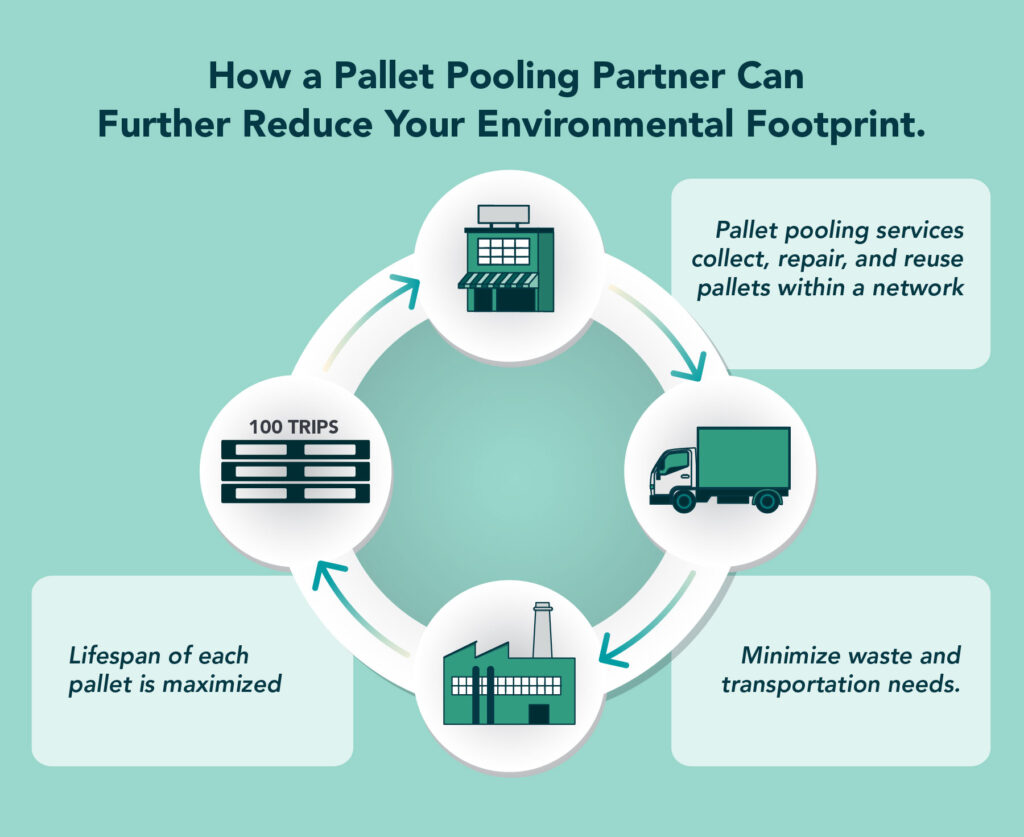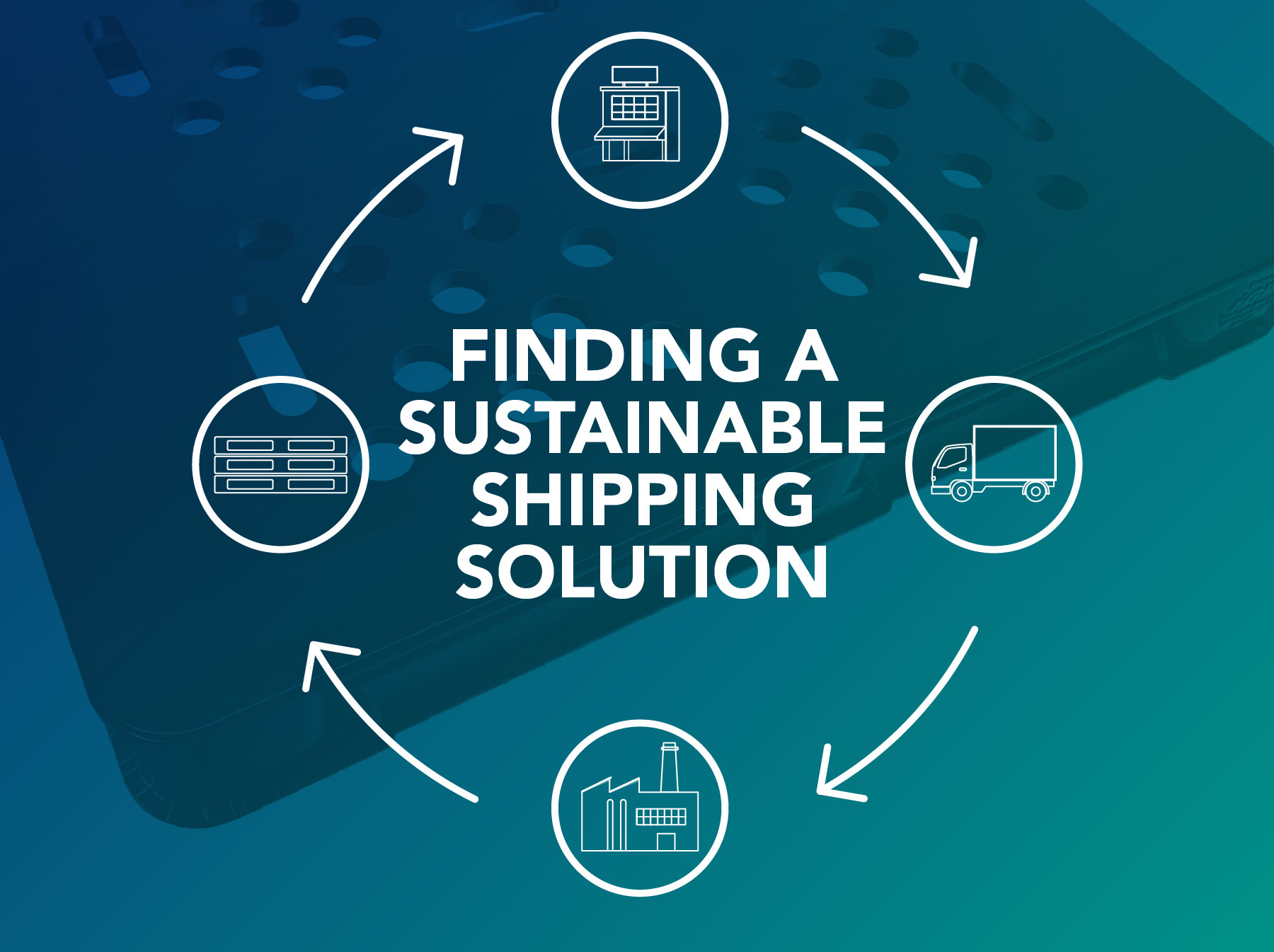Eco-friendly pallets are gaining traction as businesses look to minimize their environmental impact. These pallets not only help companies reduce their carbon footprint through recycled materials and reusability, but they can also contribute to a circular business model that eliminates waste and maximizes resource use.
Ultimately, switching to eco-friendly pallets can benefit both the environment and a company’s bottom line by lowering the total cost of business.
While the materials used in eco-friendly pallets are important, how you acquire them can offer even greater environmental benefits. Pallet pooling services, unlike traditional sellers, rent reusable pallets instead of selling them outright.
This approach drastically reduces waste and minimizes your company’s carbon footprint by promoting reuse. To truly maximize your green impact, it’s important to consider not only the pallet type but also the provider’s model.
Types of Eco-Friendly Pallets and Their Benefits and Drawbacks
While “eco-friendly” can encompass a wide range of practices, for pallets, it boils down to minimizing environmental impact. There are three main types of eco-friendly pallets that achieve this goal:
| Type | Pros | Cons |
| HDPE Plastic | Highly Recyclable: HDPE plastic can be recycled numerous times, minimizing environmental impact. Lightweight Champion: Their lighter weight reduces overall load weight, leading to lower fuel consumption and reduced carbon emissions during transportation. Eco-Friendly Material: Plastic doesn’t contribute to deforestation. | Recycling is Crucial: If not recycled, these pallets take an estimated century to decompose. Higher Initial Cost: The durability and extended lifespan of HDPE plastic pallets can make them a more expensive upfront investment compared to wood. Bulk Purchases: Acquiring HDPE pallets in bulk might be challenging due to their more complex manufacturing process compared to wood. |
| Recycled and reconditioned wood pallets | Reuseable: Made from salvaged wood, they reduce reliance on new lumber. Easy to Find: Many companies offer recycled pallets, making them readily available. | Weight Variations: Since they’re crafted from reused lumber, the weight of each pallet may differ slightly. Wood can also change weight when it absorbs moisture. Inconsistent Construction: The number of boards and overall quality can vary between pallets due to the nature of recycled materials. |
| Corrugated paper pallets | Lightweight: Like plastic pallets, they reduce truck weight, lowering fuel consumption and emissions. Budget-Friendly: They are a very cost-effective pallet option. Hygienic Choice: Typically designed for single use, they minimize contamination risks. | Weight Restrictions: They may not be suitable for heavy products due to limited weight capacity. Frequent Replacement Needed: Their disposable nature means they require frequent replacements. Moisture Sensitivity: Avoid using them in damp environments as they can become structurally compromised. |
The Environmental Benefits of Pallet Pooling

The Environmental Benefits of Pallet Pooling
While recycled wood, reconditioned wood, and corrugated paper pallets are all eco-friendly options, only wood and plastic are suitable for pallet pooling programs.
Pallet pooling services collect, repair, and reuse pallets within a network, minimizing waste and transportation needs. This model maximizes the lifespan of each pallet, further reducing your environmental footprint.
Renting pallets through pooling services offers significant environmental advantages beyond cost savings. Providers prioritize responsible recycling at the end of a pallet’s life and implement extensive maintenance programs to maximize lifespan, especially for complex-to-manufacture plastic pallets, which are reused numerous times before becoming “new” plastic through recycling.
Pallet pooling services are circularity champions, keeping materials in use for longer. Unlike the traditional “take, make, dispose” model that generates waste, pallet pooling prioritizes reuse. Broken pallets are repaired and reintegrated into the system, while those reaching their end-of-life are responsibly recycled.
As noted by iGPS President and CEO Jeff Pepperworth in an interview with Inbound Logistics magazine, the growing focus on sustainability and emission reductions, coupled with the elements around the compatibility of pallets with automation, is leading to more customers adopting iGPS plastic pallets as a solution.
Combining eco-friendly pallets with pooling creates a powerful sustainability strategy. Lightweight, recyclable materials like plastic minimize waste and carbon footprint. For businesses aiming to balance being green with keeping costs down, eco-friendly plastic pallet pooling offers a winning combination. This approach allows them to be good corporate citizens while maintaining healthy profits.
Manufacturers seeking eco-friendly shipping solutions can opt for iGPS plastic pallets for their logistics operations. Our plastic pooling shipping platforms are recyclable and also more durable than wood, reducing waste. For more information, contact us at 1-866-557-0047, email a specialist at switch@igps.net, or visit our contact page.




